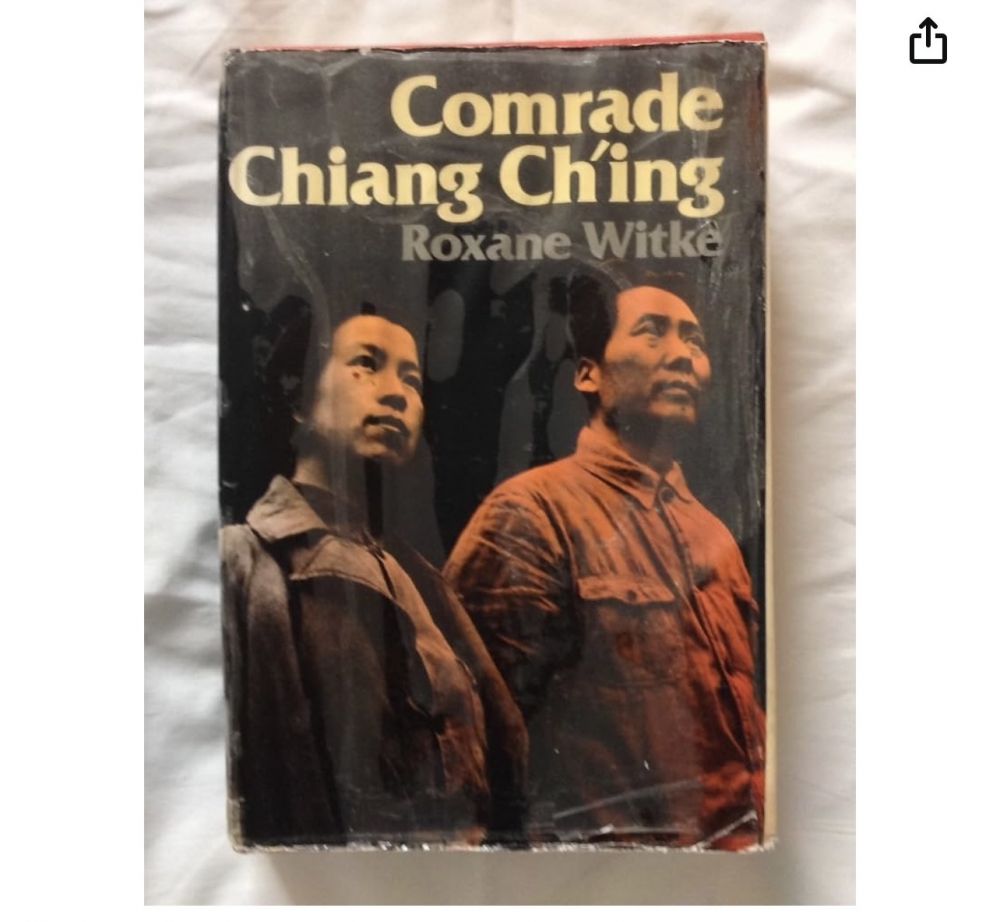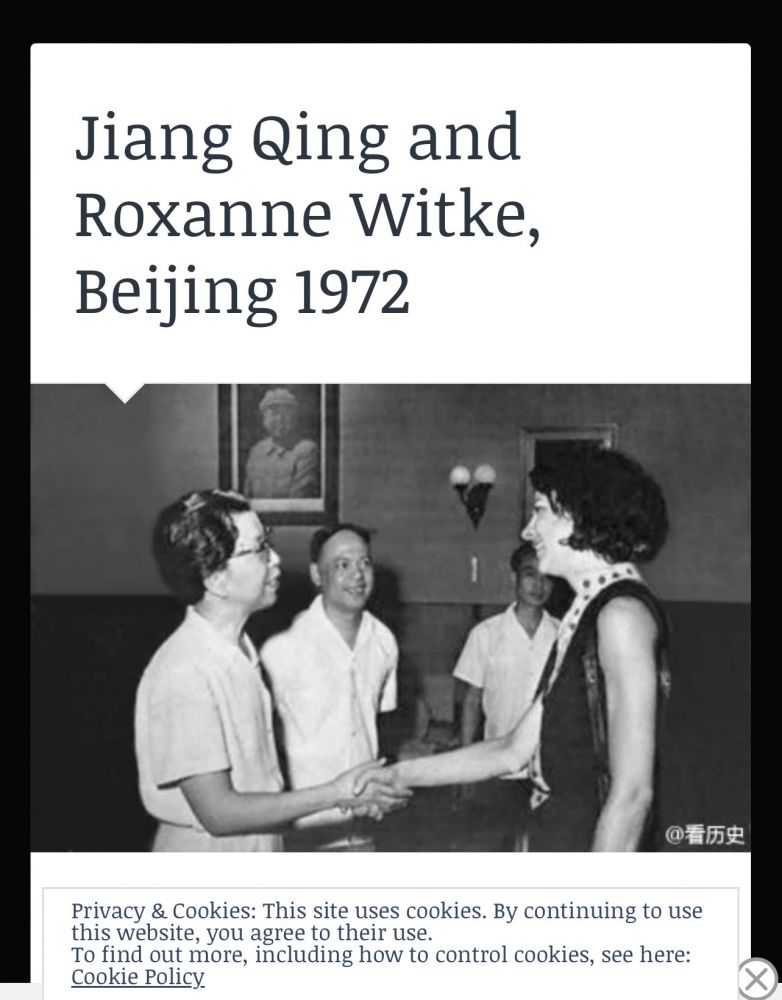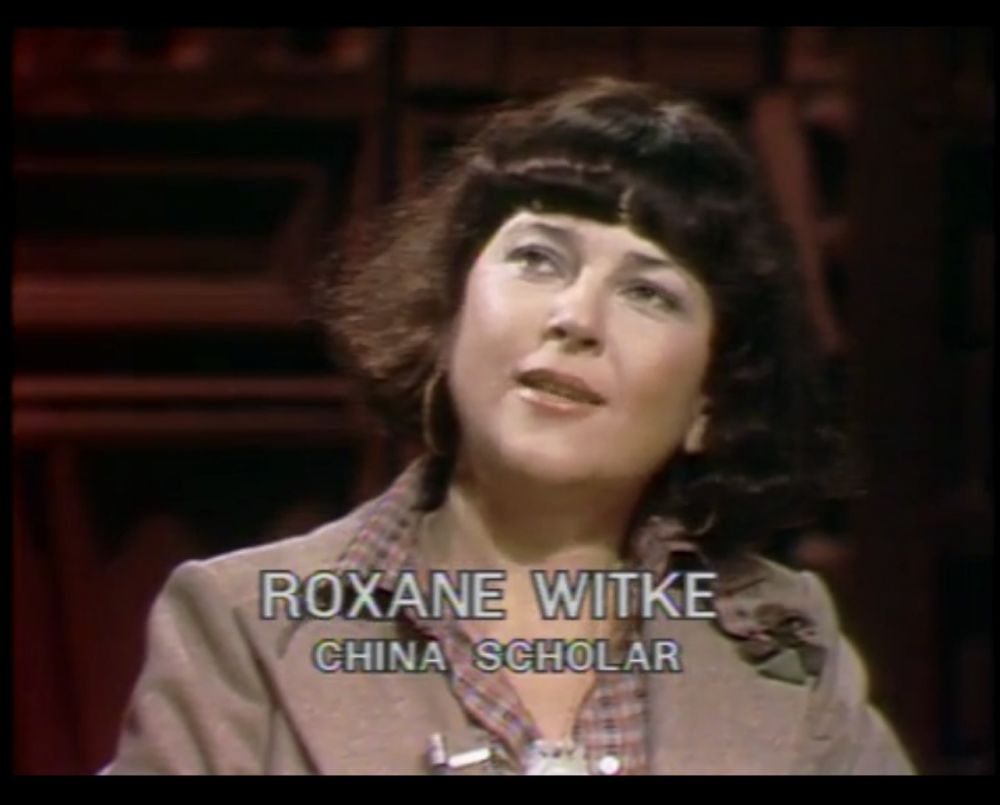雅美之途
教育,人文,社会
美国仍然遵循着开国元勋所向往的传统,他们当年冒死打仗的目的是为了自己未来的儿子或孙子能够做文学、学建筑或谈政治。当我们审查美国人文领域的著名人物,或者那些中国问题专家,我们发现他们多半是成长于美国家境优越的社会阶层。
他们包括这位风情万种的哥大教授黎安友的前妻,Roxane Witke。她在中国文革正浓的1972年,在基辛格和尼克松访华后不久,对中国女皇江青进行了长时间的访谈。
这里有个数量级的区别与概念,因为社会需求和大学养活他们的成本,在美国成为人文领域的教授比当医学院的教授要难很多。

Jim Lehrer和Robert MacNeil对Roxane Witke的采访非常精彩,让我们可以更全面地了解那段历史。
让我先说些整理后的感言:
中国政治的最大问题是,至今为止仍然没有找到最高权力的平稳过渡机制。每次高层权力的转换几乎都是黑箱操作,总是伴随着将对手投入监狱的血腥行动。
江青在自己的丈夫毛泽东去世七周后被捕,她最终以77岁的高龄上吊自杀身亡。她见Roxane Witke的1972年处于权力的顶峰,年仅58岁。但是她已经预感自己的权力不会长久,所以急于将她的人生故事通过美国人传递出去。
四人帮倒台后,华国锋作为过渡让所谓的“好皇帝”邓小平上台。邓小平扶持过胡耀邦和赵紫阳作为接班人,但是都因各种原因失败,即使作为好皇帝的邓小平也在任内出现了64流血事件。
猫儿上台后将薄熙来和周永康整肃,以及将可能高达百万级别的对手投入监狱。现在澳门特首见猫儿就像儿子见到严父似的,在猫儿会见军中人士的视频,他们鼓掌的场景已经与北韩的金三胖视察时相似。猫儿至今没有接班人浮出水面,他已经70岁,面容的浮肿以及虚胖让人怀疑他的健康。我们不知道在他这个坏皇帝之后,中国何时会出现一个好皇帝。
中国的历史就是在福山所说的好皇帝与坏皇帝之间循环,如今的美国人已经从理论、立法和行动上都彻底看穿了中国,最近美国又通过国防授权立法将中国和香港与澳门定为“海外敌对势力”。
最后我想说的是江青的传奇人生,我们需要以客观的角度去评价历史人物。中共最差劲的就是非黑即白,这样利于他们的统治。
作为山东工匠的女儿,她在家乡就加入共产党。她去上海当演员谋生,同时在基督教与共产主义文化中做选择。她最终决定抛弃十里洋场的奢靡演艺生活,去延安投奔革命。随后与共党头目恋爱,为他生女儿李纳传基因。
在艺术上的天份使她在资深年龄开始学习西洋音乐,还尝试做交响曲,写小说故事。我们可以从她创作的中西合壁的样板戏和芭蕾舞体会到,如果她有留学背景那会更了不起。
在任何开放的社会,江青本来是才女一枚,她拥有极高的天份和领悟力。但是在共产体制内的贪婪控制人的权欲,使她走火入魔地迫害人,最后将自己也玩完了。
皮皮蝦在科技群的留言:“《红都女皇》作者Roxane Witke当时与江青密谈了三天,中途精彩处不忍心打断江青,硬是把尿憋在裤子里了。你可能不信,这是我小学五年级知道的,原因是四人帮倒台,中央下达的许多文件里有一篇关于《红都女皇》。当时的我就爱看《参考消息》之类。读博时闲聊,讲到这段,有一个同龄的陪读夫人一脸不信,认为以我那时的年龄,根本不可能,就是吹牛。从此再不和此人见识了。那文件下达到中级干部的。我得以在家里偷看,不是《参考消息》上的”
我的回复:“节目说是暑假,实际谈了两三天,投机时从晚上6点谈到转钟3点。江青急于将自己的信息让外国人记录,这样可以澄明她认为的国内对她的诬陷。你需要找视频看看,黎安友的前妻本身就是好莱坞级别的人物,gorgeous woman [Worship][ThumbsUp]”
只能Copy/Paste才能看到:https://americanarchive.org/catalog/cpb-aacip_507-jd4pk07q0z。这个采访视频也让我们能够重温美国新闻从业人员的绅士风采,我在美国的前几十年就是通过每天观看Jim Lehrer的PBS了解美国的,他是最棒的我们密苏里大学新闻学院的毕业生。

这是Roxane Witke接受采访的文字内容, 括号里的中文部分是ChatGPT的功劳,我略有润色。
ROBERT MACNEIL: Good evening. An incredible thing has happened in China. Only seven weeks after the death of Chairman Mao Tse-tung, the leader revered to the point of deification, his widow, Chiang Ching, has been arrested. It`s almost as though Eleanor Roosevelt had been arrested by the FBI shortly after the death of FDR and charged with treason. Chiang Ching and three other members of the top Chinese leadership are reported under arrest, stripped of their high offices and party positions. Madame Mao is charged with everything from plotting a coup to nagging her husband to death. Why is this woman so important? What is her fate likely to be? That what we consider tonight.
(晚上好。在中国发生了一件不可思议的事情。在备受崇拜甚至尊为神明的领导人毛泽东主席去世仅仅七周后,他的遗孀江青被逮捕了。这就好像埃莉诺·罗斯福在富兰克林·罗斯福去世后不久,被FBI逮捕并被指控叛国一样不可思议。据报道,江青和其他三名中国高层领导人被拘留,被剥夺高级职务和党内职位。毛主席夫人被指控从密谋政变到折磨丈夫致死等罪名。为什么这个女人如此重要?她的命运可能会怎样?这是我们今晚要讨论的话题)
Jim?
JIM IEHRER: Madame Mao is not that well-known, except within China itself, of course, and outside only among China experts. The person in this country who probably knows more about her than anyone is Roxane Witke, Professor of Modern Chinese History at the State University of New York at Binghamton. Four years ago she spent the summer in China conducting over 60 hours of interviews with Madame Mao. She returned with an exhaustive knowledge of this powerful, mysterious woman as well as a lot of photographs and both have been combined into a book, entitled Comrade Chiang Ching, to be published by Little, Brown this spring.
She has also brought her knowledge and a few of those photographs with her tonight, and she`s now with Robin in New York. Robin?
(JIM IEHRER: “毛夫人在中国以外并不那么出名,除了中国本身,当然,在中国问题专家中,她倒是比较知名。在我们美国,对她了解最多的人可能就是Roxane Witke了,她是宾汉姆顿纽约州立大学的现代中国历史教授。四年前,她在中国度过了一个夏天,对毛夫人江青进行了长达60多个小时的采访。她带回来了对这位强大而神秘的女性的详尽了解,还有许多照片,这些都将被整合到一本名为《红都女皇》的书里,将由Little, Brown在今年春季出版。
她在今晚也带来了自己的知识和一些照片,现在与罗宾在纽约进行访谈。罗宾?)。

McNEIL: Professor Witke, simply, why is she under arrest -what`s the simple explanation?
ROXANE WITKE: Well, the overt explanation is that she plotted to seize power and caused the Chairman to die more quickly than he might have -- "nagged him to death." Of course, that`s not the only explanation. I think part of the explanation is that she possessed a great deal of power and the other people who were arrested with her did as well, particularly over the media -- over the press, over public opinion -- and that, through control of the performing arts, a very strong hand over literary policy, education policy: the realm of ideas, or what the Marxians call the "superstructure."
(McNEIL: Witke教授,简单来说,她为什么被拘留——简单的解释是什么?
ROXANE WITKE: 嗯,显而易见的解释是她密谋夺权并导致主席比原本可能更快地去世——“折磨他致死”。当然,这并不是唯一的解释。我认为部分解释是她拥有极大的权力,和与她一同被逮捕的其他人一样,尤其是对媒体、新闻、公众舆论的控制。而且,通过对表演艺术的控制,在文学政策、教育政策上有着非常强大的影响:这涉及到思想领域,或者马克思主义者所称的“上层建筑”)。补充评论:真是神奇,ChatGPT可以将教授所说的“Superstructure”翻译成“上层建筑”,我肯定翻不出来。
MacNEIL: Could you give us a kind of shorthand description which will help us through the rest of this conversation -- she represents a faction, sometimes called the radicals in China, and obviously the new Chairman, Hua, represents another faction, often called the moderates; what does this mean in terms we can understand?
WITKE: I think we have to start by saying that all of these leaders are committed to China`s material progress and modernization along certain lines; and I think that they`re all committed, basically, to Mao Tse-tung`s thinking, and to continuing the revolution -- no one wants to go back and restore the dynasty or restore the Republic or bring Chiang Kai shek`s errors into the country or bring capitalism into the country, despite the language of the press. The differences lie, I think, in priorities. People like Hua Kuo-feng apparently are more interested in state management, in bureaucratic control, in normal pragmatic progress, in industrialization, in agriculture. I think that the so called ``ideologs," or radicals, are also interested in that; but they are to a degree that we cannot, in this country, comprehend, concerned with ideological purity, with good thinking and good imagery on the part of the proletarians.
(MacNEIL: 你能给我们一个简短的描述,帮助我们理解接下来的谈话吗——她代表一派,有时被称为中国的激进派,而新的华主席也代表另一派,通常被称为温和派;这在我们可以理解的术语中意味着什么?
WITKE: 我认为我们必须先说,所有这些领导人都致力于中国在某些方面的物质进步和现代化;我认为他们基本上都坚持毛泽东的思想,继续革命——没有人想要回到恢复朝代或恢复共和国,或者把蒋介石的错误带入那个国家,或者把资本主义带入那个国家,尽管新闻报道的措辞如此。我认为分歧在于优先事项。像华国锋这样的人显然更关心国家管理、官僚控制、正常的务实进步、工业化和农业。我认为所谓的“意识形态派”或激进派也对此感兴趣;但是在某种程度上,我们美国无法理解,他们更关注意识形态的纯洁性,关注无产阶级的良好思想和形象)
MacNEIL: They`re worried about the souls of the people, are they?
WITKE: Oh, they don`t use that language -- not yet. No, they are concerned that people who were formerly poor, and still are basically poor, feel good; and that elitism on the part of any persons, whether they are more educated or more skilled in certain ways, does not make poor people, who are the 800,000,000 or so of the country, feel crummy -- feel inferior.
(MacNEIL: 他们关心人民的灵魂,是吗?
WITKE: 哦,他们并不用那种语言——还没有。不,他们关心的是,那些过去贫困,现在仍然贫困的人舒服。任何精英阶层,无论是受教育程度更高或者更有技能的,他们都不希望让这个约 8 亿人口的国家的贫困人口感到自卑或沮丧)
MacNEIL: I see. Is Chiang Ching, now arrested, the sort of woman or person capable of having done the things she`s charged with doing -- plotting a coup, hastening her aged husband`s death, and so on?
WITKE: Yes, well, it`s hard for me to know who would have leaked the story of her hastening her aged husband`s death; there`s something apocryphal about that. As for plotting a coup, many coups have been plotted in Chinese history, from imperial times on down -or on up -- to revolutionary history. She was the near-victim of a coup launched by Lin Piao in 1971 and managed to escape that, and was still suffering from that when I met her in 1972 —the physical and psychological effects. So I suppose that she might have plotted a coup, but none of us know precisely; but that is a way of Chinese politics.
(MacNEIL: 我明白了。被逮捕的江青,她是那种能够做出她被指控的事情的人吗——密谋政变、加速她年迈丈夫的死亡等等?
WITKE: 我很难知道是谁泄露了她加速年迈丈夫死亡的消息;这件事有些虚构的成分。至于密谋政变,在中国历史上,从帝制时代一直到革命历史,都有许多政变被策划过。她在 1971 年曾经是林彪发动政变的近期受害者,她设法逃脱了那场政变,并且在1972 年我见到她的时候,仍然受到了那次事件的身心影响。所以我想她可能曾经密谋政变,但是我们都不确定;但这是中国政治的一种方式)
MacNEIL: Jim?
LEHRER:. Yes, Professor Witke, let`s talk for a few minutes about Madame Mao, the person; first, some basic biography, beginning with her early life -- what was that like, as best as you could find out from her?
WITKE: The way she reconstructed it, she was born to a poor family; she was the daughter of a cartwright. She was the youngest of many children -- she didn`t care to talk about her family very much. She deplored her father; he was a wife-beater and a child-beater. She escaped home when she was 14 or 15, studied drama and acquired a profession of her own at a very early age, and managed herself from that time onward.
(MacNEIL问:吉姆?
Lehrer回答:是的,Witke教授,让我们使用几分钟谈一谈毛主席夫人这个人。首先,谈谈她的基本传记,从她的早年生活开始——你从她那里了解到的最重要的是什么?
Witke回答:根据她的描述,她出生在一个贫困家庭;她是一位cartwright(车匠?)的女儿。她是众多子女中最小的一个——她不喜欢谈论自己的家庭。她谴责她的父亲;他是一位打妻子和孩子的人。她在14或15岁时离家出走,学习戏剧,并在很早的年纪就有了自己的职业,从那时起就开始独立自主地生活)

LEHRER: She worked in a library for a while, did she not?
WITKE: Yes, I don`t think that was terribly important -- she punched cards, or something like that. At the time, she was an auditor at a university and she was listening to lectures by significant intellectuals who turned her on to ideas and foreign literature, encouraged her to try her hand at writing short stories and plays.
(LEHRER: 她不是在图书馆工作过一段时间吗?
WITKE: 是的,我觉得那并不是非常重要——她曾打过卡片,或者类似的工作。当时,她在一所大学做过审计员,并且听了一些重要知识分子的讲座,这些讲座让她对各种想法和外国文学产生了兴趣,他们鼓励她尝试写短篇小说和剧本)。
LEHRER: When did she become a communist, while she was in college ?
WITKE: No, I don`t think we can say she was exactly in college. She was an auditor; she was too poor to go to college, and she takes pride in that, as Mao has, too, in having had very little formal education to have instead come up through the school of brigands that is, making your own way the hard way. She became communist through the underground in Tsingtao, in Shantung province in 1933.
(LEHRER: 她是在大学时期成为共产主义者的吗?
WITKE: 不,我不认为她真的读过大学。她当时是一名审计员;她太穷了,上不起大学,她为此感到自豪,就像毛泽东也为自己几乎没有正规教育而自豪,他是通过当土匪的艰难道路爬上来的。江青是在1933年通过山东省青岛地下组织成为共产主义者的)。
LEHRER: So how old would she have been then?
WITKE: She was about 19.
(LEHRER: 那时她大约多少岁?
WITKE: 她大约19岁左右)
LEHRER: All right, then she went on to become an actress -she was already interested in drama -- of sorts.
WITKE: Yes.
(LEHRER: 好的,然后她开始成为一位演员——她对戏剧已经很感兴趣了——某种程度上是吗?
WITKE: 是的)。
LEHRER: What kind of career did she have, was she a big-name actress, small-name actress -- you tell me.
WITKE: She began doing acting of foreign-type dramas when she was very young, and also opera; then she went to Shanghai, which is like coming to New York and trying to make it on Broadway, and gradually she had some success in what were called "the great foreign bourgeois dramas," like dramas of Strindberg and Ibsen, and so forth. And that`s the kind of success she enjoyed; it was very good for her ego and for her career. But at the same time she was working in the underground as an actress in proletarian theater, people`s theater, a sort of street theater, experimental theater -- which was built around political messages. And she had other work at the same time, too, in the Party underground; she was working for the YWCA and the Communist Party at the same time one wonders whether each knew of her other employment.
(LEHRER: 她的职业是什么?她是大名鼎鼎的演员,还是小有名气的演员——你告诉我吧。
WITKE: 她很年轻的时候开始演出外国类型的戏剧,还有歌剧;然后她去了上海,就像来到纽约并试图在百老汇闯出一片天地一样,渐渐地她在所谓的“优秀的外国资产阶级戏剧”中取得了一些成功,比如斯特林伯格和易卜生等人的戏剧。这是她享受到的成功类型;这对她的自信和职业生涯都非常有利。但同时,她也在地下组织以一个无产阶级戏剧演员的身份工作,人民剧院,一种街头戏剧,实验性的戏剧——它们围绕政治信息展开。同时她也在党的地下组织中做其他工作;她同时为YWCA和共产党工作,人们不禁怀疑她的每一份工作是否都知道她的其他雇主)。注明:YWCA是美国年轻女性基督教的组织,与共产党完全不同的意识形态。
LEHRER: I see. Well, that kind of speaks a little bit to what a lot of people have said, that she was a very devious, tough woman. Is that the impression that you got when you talked to her? Anybody who could be a member of the-Communist Party and the YWCA at the same time....
WITKE: (Laughing.) Yes, that was quite clever. Yes, I was impressed with her power, not in the abstract but the way in which she managed people around her; and I could see the evidence of her power in the country over the performing arts and fine arts, and the imagery of the people. There`s no advertising in China, but there`s political advertising, or propaganda; and the style and presence of people in posters and postcards -- practically anything -- is very much affected by her. It`s what I would call a Sino-Western style. The people are Chinese, their build has become Western; it`s a little more grandiose and substantial than an ordinary Chinese person -- or a Chinese person of the past -- and to that is added a certain glamour, and I think that this comes from her Hollywood experience; that is, experience of a great many Hollywood films and her own experience in film.
(LEHRER: 我明白了。这有点符合很多人的说法,即她是一个非常狡猾和坚强的女人。你和她交谈时有这样的印象吗?一个人能同时成为共产党和YWCA的成员……
WITKE:(笑)是的,那确实相当聪明。是的,我对她的权术印象深刻,不是抽象的,而是她如何管理身边的人;我能看到她在国家文艺和美术上的影响力,以及人们的意象。中国没有广告,但有政治宣传;海报、明信片上人物的风格和形象——几乎任何东西——都深受她的影响。这就是我所说的中西合璧的风格。这些人是中国人,但他们的形体已经变得更西化了;比起普通的中国人或过去的中国人,他们更加宏伟、更有实质感,加上一些魅力,我认为这来自她在好莱坞的经历;也就是说,来自对许多好莱坞电影的经验以及她自己在电影方面的经历)。
LEHRER: In, talking to her, did you get the impression that her marriage to Mao -- I think that was in 1939 -- was a most significant event in her life, or -- she`d been married twice before -- how did she talk about the marriage itself, or did she at all?
WITKE: She was not very interested in marriage; and of course, before one meets the wife of Mao Tse-tung you think about her marriage, or you think, perhaps, about previous marriages that she had. I used to think about that, and after being in her company for some time I forgot about the question. I asked one of her aides indirectly if she would care to talk about it, knowing that it might infuriate her, and I didn`t care to witness that, and she responded negatively to the question.
(LEHRER: 在和她交谈中,你是否觉得她与毛泽东的婚姻——我记得是在1939年——是她一生中最重要的事件,还是说——她之前结过两次婚——她是怎么谈论婚姻本身的,或者她是否谈论过?
WITKE: 她对婚姻并不是很感兴趣;当然,在见到毛泽东的妻子之前,你会考虑她的婚姻,或者你可能会考虑她之前的婚姻。我以前曾考虑过这个问题,但在和她在一起一段时间后,我就忘记了这个问题。我间接地问了她的一个助手她是否愿意谈论这个话题,因为我知道这可能会激怒她,而我不想看到那种情况,她对这个问题的回答是否定的)。
LEHRER: What did you ask her?
WITKE: I asked her if she would care to have the opportunity to speak about previous marriages.
(LEHRER: 你问了什么问题?
WITKE: 我问她是否愿意有机会谈谈之前的婚姻)。
LEHRER: Oh, I see.
WITKE: She didn`t care to have it.
(LEHRER: 哦,我明白了。
WITKE: 她并不在意谈论)。
LEHRER: Right. What about her marriage with Mao?
WITKE: Well, that happened; it certainly wasn`t the most significant event in her life -- on her bio, so to speak -- but without that link, she would have had a fairly ordinary career, I suppose. It`s hard to say.
(LEHRER: 对了。那么她和毛泽东的婚姻呢?
WITKE: 嗯,那件事发生了;从某种程度上来说,那并不是她一生中最重要的事件——就她的传记而言——但如果没有这个联系,我想她的职业生涯可能会相当普通。这很难说)。
LEHRER: Did she speak in personal terms, the way wives are supposed to speak of their husbands, about Mao?
WITKE: Well, occasionally she remarked on certain of his habits, or the way he joshed her-about certain things -her having had so much bourgeois experience. She is much more knowledgeable in the arts, and she`s read many more novels and modern literature, and Russian literature and American literature and so forth -- French literature -- than Mao ever had; and I think that she lorded it over him a bit on that point. But she knew far less about ancient history, and they used to joke about that -- she remarked about that, or other habits that he had. But he was not her major subject of interest was any impression.
(LEHRER: 她在个人层面上,像妻子一样谈论毛泽东吗?
WITKE: 有时她会谈论他的某些习惯,或者他拿她开玩笑——关于她曾有过很多资产阶级的经历之类的事情。她在艺术方面更有知识,阅读了更多的小说、现代文学、俄国文学、美国文学等等——还有法国文学——比毛泽东多得多;我觉得在这一点上她有点看不起他。但是她对古代历史了解得远远不及他,他们常常开玩笑谈论这一点——她会提到这个,或者提到他其他的习惯。但是毛并不是她主要感兴趣的话题)
LEHRER: All right. Robin?
MacNEIL: So you wouldn`t classify her, then, as the traditional consort of a great main, the kind of intellectual concubine, perhaps, who drew her power only from him and her association with him?
WITKE: No.
LEHRER: 好的,Robin?
(MacNEIL: 那么你不认为她是一个伟大男人的传统伴侣,也就是那种只从他和与他的关联中获得力量的知识女性,也许是智力上的姬妾?
WITKE: 不是)。
MaCNEIL: What gave you the feeling that she was her own person? That`s what I really want to know.
WITKE: She was quite imperious. When she spoke -- and she was unique in this respect among persons I spoke to in China -- I had the feeling that she had not asked anyone first whether it was all right to say that. She decided what was-correct, and she was not seeking permission from anywhere; of course, she was taking great risks in doing what she did.
(MaCNEIL: 是什么让你觉得她是独立的个体?这才是我真正想知道的。
WITKE: 她相当专横。当她讲话时——在这一点上她与我在中国谈过话的其他人不同——我感觉她并没有先征求任何人的意见,就这样说了出来。她决定什么是正确的,她并不寻求任何地方的许可;当然,她这样做冒着很大的风险)。
MacNEIL: In giving you these interviews, you mean.
WITKE: Yes; and saying so much about the past, but this was her only chance of getting this information out -- it had to go out of the country in order to get published. But her real interests, I think, were in controlling large numbers of people in power and in changing their lives -- not in Mao and his habits; certainly she respected his intellect very highly, and his method of revolution. She quoted no other revolutionary leader so prolifically as she did Mao. But her real interest lies in using the arts to change people`s consciousness.
(MacNEIL: 是指你们进行这些采访时?
WITKE: 是的;并且谈论了这么多过去的事情,但这是她唯一能将这些信息传出去的机会——这些信息必须离开国家才能被出版。但我认为她真正的兴趣在于成为可以拥有很大的控制人的权力,改变他们的生活——而不是在毛和他的习惯上;当然,她非常尊重他的智慧,以及他的革命方法。在引用其他革命领袖方面,她引用毛的数量是最多的。但她真正的兴趣在于利用艺术改变人们的意识)。
MacNEIL: Why was it so important to her to get certain information out of the country?
WITKE: It`s not possible, in China, to publish a biography. You cannot write an autobiography in China and you cannot commission one to be published. When Mao was in Yenan in the late 1930`s, Yenan was open to some foreign journalists -- a variety of foreign journalists -- and Mao did give his story to Edgar Snow. Chiang Ching was not on the scene for a couple of years, until a couple of years after that had happened; so she had missed her opportunity, it was very clear, and this was her last chance.
(MacNEIL: 她为什么如此重视将某些信息传出国?
WITKE: 在中国,出版传记是不可能的。你不能在中国写自传,也不能委托出版自传。在1930年代后期毛泽东在延安时,延安对一些外国记者是开放的——各种各样的外国记者——毛确实向埃德加·斯诺讲述了他的故事。而江青在那段时间内并不在现场,直到那之后的几年才进入,所以她错过了机会,这是非常明显的,也是她的最后机会)。
MacNEIL: And that would be discouraged so as not to encourage a cult of personality, or the egotistical satisfaction of having your own life story read by...
WITKE: Yes; the masses make history.
(MacNEIL: 那会被劝阻,以避免鼓励个人崇拜或因为自己的生活故事被阅读而满足自我...
WITKE: 是的;群众创造历史)。
MacNEIL: I see. And what is significant in what she has told you, and you are going to publish, is just the details of her life story as she recounted them -- that`s the important thing, is it?
WITKE: Yes, I would say so; and struggles within the party, and how she`s had to fight for power, and how she won over cultural groups and how she taught herself music, for example, in order to write a symphony. She didn`t know how to play a clarinet or an oboe -- she learned. She taught herself, and people laughed at her. This was in the early 1960`s; she went to the Central Philharmonic Orchestra and told the conductor that she wanted to learn-the instrument so she could revolutionize his music. Of course, he was shocked.
(MacNEIL: 我明白了。她告诉你的内容,以及你将要出版的,最重要的就是她口述的生平细节,对吗?
WITKE: 是的,我会这么说;还有党内的斗争,以及她为权力而斗争的经历,以及她是如何赢得文化团体的支持,比如她自学音乐,为了创作交响乐。她不知道如何演奏单簧管或双簧管——但她学会了。她自学,并且人们嘲笑她。这是在1960年代初期;她去了中央爱乐乐团,并告诉指挥家,她想学习乐器以便改革他的音乐。当然,他震惊了)。
MacNEIL: What was your relationship with her?
WITKE: I was her guest -- how also should I describe it? My relationship with her evolved...or I should say that my perception of it coalesced in the course of being with her two or three days before the interviews were over. I noticed, as she pointed out, she said that Mao used to criticize her for trying to do everything by herself. She should be more of a bureaucrat, he said, obviously joking, and she should learn how to delegate power. And so she pointed around the room to her various aides and doctors and so forth and said, "You see, I`ve surrounded myself with young people to whom I`ve delegated authority." And it was clear to me then that I was one of the people whom she had commissioned with a certain task.
(MacNEIL: 你和她的关系是怎样的?
WITKE: 我是她的客人 — 这种关系该怎么形容呢?我的关系随着时间演变……或者我应该说,在接近采访结束的两三天里,我对这种关系的看法逐渐清晰了起来。我注意到,正如她指出的那样,她说毛过去常批评她试图亲力亲为做所有事情。他开玩笑地说,她应该更像一个官僚,学会授权。于是她指着房间里的助手和医生等等说道:“你看,我围绕自己和一些年轻人,给予他们权力。” 那时我明白了,我就是她委派了特定任务的人之一)。

MacNEIL: What do you suppose was her own personal motive in wanting to have this story told outside? How do you explain that to yourself?
WITKE: She has a strong sense of history. I think she was aware of the great risks she had taken in seeking such power as she possessed at that point and continued to possess, and there would be no other chance of her having her record set straight. And many of the people she had silenced or destroyed had published unfavorable stories about her past, and in the course of the cultural revolution a dossier was built up about her which was incriminating of her in many respects. And perhaps she thought that by having something published in a foreign country it would not be tampered with; it would be solid, in a sense. Of course, she didn`t make the task easy for me. She had to give me hints. She couldn`t say many things directly: If you read such an essay and see the point analogously, you`ll understand.
(MacNEIL: 你认为她想要把这个故事讲出去,背后有什么个人动机?你怎么解释这个情况?
WITKE: 她对历史有着强烈的意识。我认为她意识到自己在追求权力时所承担的巨大风险,尤其是她在那个时候拥有并一直保持着的权力。她意识到没有别的机会能让她的记录得以真实地呈现。很多曾经被她整肃或摧毁的人发表了不利于她的言论,而在文化大革命期间,有一份她的档案,从很多方面都指控了她。也许她认为通过在外国出版一些东西,它就不会被篡改;在某种意义上,它会更加真实。当然,她也没有让这个任务变得简单。她必须给我一些提示。她不能直接说很多事情:如果你读了我的文章并类比其中的观点,你就会明白的)。
MacNEIL: I see. She`s often described, I`ve read, as "resolute," as a person capable of taking her own fate in her hands; how does she show that, or how did she show that, in person?
WITKE: I`ve called her willful -- resolute, yes; extremely autonomous in her ways. She didn`t converse, really, with anyone; she made statements and conducted a monologue for hours on end, until three, four in the morning, starting a six or seven at night, breaking for a meal or perhaps a promenade or a game of pool, or something like that. But she was the sole mistress of the timing she would ask me how we should proceed, and so forth. I don`t think she really expected me to make the decision -- I always threw back the initiative to her. She was used to that.
(MacNEIL: 我明白了。我读过她经常被描述为“坚决”的人,一个能够掌握自己命运的人;她是如何展现这一点的,或者说她是如何在现实中展示这一点的?
WITKE: 我称她为固执 — 是的,坚决,极其独立。她真是不与任何人交谈;她对我发表声明,对我进行了数以小时的独白,直到凌晨三四点,从晚上六七点开始,我们中间休息吃饭,或者散步,或者打一局台球,或者类似的事情。但她完全掌控着时间,她会问我,我们该如何继续等等。我觉得她并不是真的期待我做决定 — 我总是将主动权交回给她。她习惯了这样)
MacNEIL: Thank you. Jim?
LEHRER: You say that she wielded great power. What influence did she actually have, say, on society in China? Can you point to any particular things in the society there that changed as a result of her, specifically?
WITKE: Yes; well, let`s imagine that you were just an ordinary man on the street in Peking and you were in Peking in the early 1960`s. If that were the case, you could see a variety of movies on ancient and modern topics; you could see movies from foreign countries, you could see ancient and modern drama, you could see opera, you could listen to Chinese music. You might even listen to some Western symphonies at the same time. If you were a woman you might curl your hair and wear a dress, or if you were a man you might wear your hair rather long -- maybe the early `60`s is too early for that. There was a considerable freedom and cultural liberalism. And you might write a story of a type that you thought was fairly useful for the Revolution. Since the cultural revolution, all that ended. There are no foreign films in China. All the filmmakers who built up careers in the `30`s and the `40`s were silenced -- what "silenced" means I`m not sure -- and the only films and dramas to appear were those that were constructed by Chiang Chin...and symphonies. The so-called "model operas" and "model ballets -- there are about three model ballets and five or six model operas -- and these were designed really to establish classics for a new era. The Chinese are very historically minded, as you know, and I think that they have conceived of this particular regime or dynasty, whatever you`d like to call it -- a founders` regime -- as starting afresh, with ideas, views of the past and views of the future in conception of human nature; and to do that a new literature and a new drama and a new language has been conceived.
(MacNEIL: 谢谢。吉姆?
LEHRER: 你说她拥有巨大的权力。她实际上对中国社会有什么影响?你能指出她具体导致了中国社会发生了哪些特定变化吗?
WITKE: 是的,我们来想象一下,假设你是北京街头的普通人,而且是在1960年代初期的北京。如果是这样的话,你可以看到各种关于古代和现代主题的电影;你可以看到来自外国的电影,可以看戏剧,可以看戏曲,可以听中国音乐。甚至可能听到一些西方的交响乐。如果你是女性,你可能会弄卷发,穿裙子。如果你是男性,你可能留着比较长的头发 — 或许60年代初期这些都还有可能。那时有相当多的自由和文化自由主义。你可能会写一个你觉得对革命相当有用的故事。自文化大革命以来,所有这些都结束了。中国没有外国电影。所有在30年代和40年代建立起职业生涯的电影制片人都被禁言了 — “禁言”是什么意思我不太确定 — 出现的唯一电影和戏剧是由江青构建的……还有交响乐。所谓的“样板戏”和“样板芭蕾舞剧” — 大约有三个样板芭蕾舞剧和五六个样板戏 — 这些实际上是为了为新时代确立经典作品。中国人对历史非常在意,你知道的,我想他们认为这个特殊的政权或朝代,无论你愿意称之为什么 — 是一个创始人的政权 — 在观念上重新开始,对过去和未来的观点以及对人性的理解;为了实现这一点,他们构想出了新的文学、新的戏剧和新的语言)。
LEHRER: And she, literally, was the judge of all this, right, as to what was acceptable?
WITKE: She was the major animist behind this.
(LEHRER: 确切地说,她是这一切的裁判,对什么是可接受的?
WITKE: 她是这一切背后的主要推动者)
LEHRER: Did she have any special problems rising to power, or getting all of this done that you just went through, because she was a woman?
WITKE: Yes, I would say of course she had. For one thing, never in Chinese history has a woman been an authority on culture; men have always been authorities on culture. She was formally an actress -- actresses were despised. Not until very recent years were actresses accepted, but it`s because they`ve been under very tight political control.
(LEHRER: 她在上台掌权或完成你刚刚提到的所有事情时,作为一个女性,是否遇到过特殊的问题?
WITKE: 是的,我可以说她当然遇到了。首先,在中国历史上,从来没有女性成为文化权威;男性一直是文化权威。她以前是一名女演员 — 女演员曾经备受鄙视。直到最近几年,女演员才开始被接受,但这是因为她们一直受到非常严格的政治控制)。
LEHRER: Are the women of China liberated, in whatever comparative way you can give us -- compared, say, with society here, women in American society or Western society?
WITKE: It`s so hard to compare -- the same with men, it`s hard to compare men`s lib in China and America.. I think that women benefit from the expectation that they are to work, and that their marriages shouldn`t be a burden on them and that their children shouldn`t be a burden. And in that respect, they are liberated from many of the drags and extra responsibilities that women have in other countries.
(LEHRER: 中国的妇女在解放方面如何,能否给我们做个比较 — 比如说,与美国或西方社会的妇女相比?
WITKE: 这很难比较 — 和男性一样,在中国和美国男性解放方面也很难比较。我认为妇女受益于人们对她们工作的期望,他们的婚姻不应成为负担,他们的孩子也不应成为负担。在这方面,她们可以从许多其他国家妇女所面临的诸多困扰和额外责任中解放出来)。
LEHRER: So you don`t believe -- not in a big way, at least -- that the fact that Madame Mao is a woman kept her from accomplishing what she wanted to accomplish. Obviously, it didn`t, because look at all she did accomplish.
WITKE: Yes. You see, that was a revolutionary act in itself. No one in China, however, has ever commended her for doing all of that and being a woman, too; but there is no other woman among the Chinese leaders with an equal, or even nearly-equal power, that she has held. And so she has been unique in that respect. I don`t think that we can call her a straw in the wind of women`s liberation in China, necessarily.
(LEHRER: 所以你不认为 — 至少不是在很大程度上 — 毛夫人是一位阻止了她实现自己想要实现目标的女性。显然不是,因为看看她所取得的成就。
WITKE: 是的。你看,这本身就是一个革命性的行为。然而,在中国,没有人因为她是做了所有这些事情的女性而称赞过她;但在中国领导人中,没有其他女性具有像她拥有的同等甚至近乎相等的权力。因此,在这方面,她是独一无二的。我不认为我们必然可以说她是中国妇女解放风潮中的一个象征)。
LEHRER: She was just one of a kind, and there aren`t any others there...
WITKE: She`s one of a kind. She was married to the right man at the right time, with the right particular temper that she`s had, and training in the arts and extreme great skills in managing and manipulating people.
(LEHRER: 她只是独一无二的,那里没有其他人……
WITKE: 她是独一无二的。她在恰当的时间找对了人结婚,加上她所具备的特质,以及她在艺术上的训练和极其出色的管理和操纵人的技能)。
LEHRER: All right. Robin?
MacNEIL: In her account of modern Chinese history, did she say anything that startled you, or gave you a very fresh view, a reinterpretation that gave you a different view of the developments since the success of the Communist Party and the rise of Mao -- the victory over the Kuomintang, and so on?
WITKE: I wish I had an easy answer to that. My answers, or my reactions, were gradual in formulating. I think that one impression is that of the extraordinary power that the individual leaders have held, and what a personal government it has always been. Until recent years -- the last few years -- the same people have been more or less in control of the country, and they`ve known each other very well and they`ve managed very informally at the top; their particular titles have not been terribly important. And the correct line -- or the truth -- has always laid with Mao. What the difference now, of course, is that Mao is not there to re-establish what is the correct line and who are the deviationists from that line, with the result now that we find, only a few months ago T`ung Hsiao-ping, for example, as was Liu Shao-ch`i before him, maligned as a capitalist roture. Now, Chiang Ching, who was thought to be so ultra-left and radical and so forth, and pure proletarian has been called a capitalist roture. Well, what does capitalist roture" mean? It`s like calling a cat a cur -- it`s just names now. So I suppose what I`m so impressed by is how the leaders who have wanted to sustain power have used language in kind of directional signals about political terminology to support some and suppress others, and this goes on and on.
(LEHRER: 好的。罗宾?
MacNEIL: 在她关于现代中国历史的描述中,有没有什么让你震惊的事情,或者给了你一个非常新颖的观点,一个让你对对共产党取得成功和毛泽东崛起以来的发展有了看法或重新解读—包括对国共战争的胜利等等?
WITKE: 我希望能给出一个简单的答案。我的回答或反应是逐渐形成的。我认为一个印象是个别领导人所持有的非凡权力,以及这是个一直以来都是个人统治的政府。直到最近几年 — 最近几年 — 同样的人或多或少控制着那个国家,他们彼此非常了解,在高层管理非常不正式;他们的特定头衔并不是非常重要。而确定的路线 — 或者说真相 — 总是掌握在毛泽东手中。现在当然的不同之处在于,毛泽东不在了,无法重新确立什么是正确的路线,以及谁是偏离这条路线的人,结果现在我们发现,就在几个月前,比如说邓小平就像之前的刘少奇一样,被诽谤为资本主义的走狗。现在,曾被认为是极端左派和激进主义者,纯粹无产阶级的江青,被称为资本主义的走狗。那么,“资本主义走狗”是什么意思?这就像把猫叫做狗 — 现在只是个名字而已。所以我想我所感到印象深刻的是,那些想要维持权力的领导人如何利用语言来给予某些人政治术语上的支持,以及压制其他人,而这种情况一直在不断地进行着)。
MacNeil: There are those in this country who appear to applaud her downfall in the sense that the victory of the other faction -the moderates, if you like, under Chairman Hua -- would be good for China`s relations with the United States. Do you have a view on that, yourself?
WITKE:I think that`s rather hard to say. As I perceive the rivalry now, it`s mainly over men and women, it`s over power positions and it`s over priorities and ideas in domestic development. The foreign consequences, I think, are rather hard to read.

(MacNeil: 在中国有些人似乎对她的倒台感到欣喜,因为是另一个派系的胜利 — 如果你愿意,可以称之为温和派,在华主席领导下 — 对中国与美国的关系可能是有利的。你对此有什么看法吗?
WITKE:我认为这相当难说。就我现在看到的竞争来说,主要是关于男人和女人,关于权力地位,以及国内发展中的优先事项和观念。我认为外交上的后果相当难以预测)。
MacNEIL: You don`t think that the period since the cultural revolution -- the various phases of that, of keeping China`s feet to the fire, ideologically -- introduced an element of irrationalism in the country, which made it less a part of the world community, if you like?
WITKE: Yes, but of course it`s only since the cultural revolution that Americans were welcomed in such droves to observe the wonders of the cultural revolution -- the barefoot doctors, the egalitarian schools, the happy children, and so forth. And the cultural revolution made China extremely attractive, too. One of the things I think we should watch for in China -- and this is an area which I find extremely interesting -- is what happens in the arts and in intellectual dissent; will there be intellectual dissent, or will there be a thaw in China, as there was after Stalin`s death, some years afterwards?
(MacNEIL: 你不认为文化大革命以来 — 在那之后的各个阶段,对中国进行意识形态上的施压 — 在那个国家引入了一种非理性因素,使其在某种程度上不再是世界社区的一部分?
WITKE: 是的,当然正是自文化大革命以来,美国人才看到如此大规模的文化大革命的奇迹 — 赤脚医生,平等的学校,快乐的孩子等等。文化大革命也使中国变得极具吸引力。我认为我们应该密切关注中国的一个领域 — 这是一个我觉得非常有趣的领域 — 就是艺术和持不同观点的异己知识分子发生了什么;会有知识分子的异议吗?或者中国会像斯大林去世后的几年那样出现解冻?)。
MacNEIL: And will there be a thaw towards the Soviet Union?
WITKE: Possibly, or just in terms of personal expression. The cultural revolution put wraps on that -- constrained people -- and Chiang Ching was as responsible as anyone for that. If she is overthrown, indeed overthrown, will her works and her policies be overthrown, and will there be more democratic expression in the country? It will be slight, whatever it is, but more.
(MacNEIL: 会不会对苏联也出现解冻?
WITKE: 可能,或者仅仅是在个人表达方面。文化大革命对此施加了限制 — 约束了人们 — 而江青对此负有同样的责任。如果她被推翻,确实被推翻了,她的作品和政策会不会被废除,国家内会不会有更多民主表达?无论怎样,程度都会很轻微,但会更多一些)。
MacNEIL: Do you have a view on that, or are you just in a position to ask the questions?
WITKE: I`m in a position to ask the questions.
(MacNEIL: 你对此有什么看法,还是你只是提问的立场?
WITKE: 我只是提问的立场)。
MacNEIL: Jim?
LEHRER: Speaking of questions, I have one, too, about Madame Mao. What happens to her now? Assume that she`s overthrown, that she`s out of power - - what do the new Chinese leaders do with her?
Do they execute her? Do they send her to the United States A la Solzhenitsyn, or does she disappear and we never hear from her again?
WITKE: (Laughing.) San Clemente.
LEHRER: What do you think?
WITKE: I think if she were executed she might become a martyr; she has had a considerable following, though the following doesn`t control public opinion right now. She might be kept comfortably; I can`t her imagine her enjoying comforts, though. She might be poisoned, and her death might be attributed to natural causes; I doubt that she would be exiled.
(MacNEIL: 吉姆?
LEHRER: 谈到问题,我也有一个关于毛夫人的问题。她现在会发生什么?假设她被推翻,她失去了权力 — 新的中国领导人会怎么对待她?他们会处决她吗?会像索尔仲尼琴那样将她送到美国,或者她会消失,我们再也听不到她的消息?)。
WITKE: (笑了笑)San Clemente(不懂含义)。
(LEHRER: 你认为呢?
WITKE: 我觉得如果她被处决,她可能会成为一个烈士;她有相当多的追随者,尽管这些追随者目前并不能控制舆论。她可能会被舒适地软禁;虽然我无法想象她享受舒适,但也有可能。她可能会被毒死,死因可能被归因于自然原因;我怀疑她会被流放)。
LEHRER: Well, do you think it`s possible for her to ever -assuming they don`t execute her and they don`t give her poison -- do you think it`s ever possible for her to ever regain the power and influence that she once had, or has she had it?
WITKE: It wouldn`t be the same sort of thing. Of course, T`ung Hsiao-ping was criticized during the cultural revolution; he was banned from the environment -- abused -- and then he was submitted to some sort of thought reform and corrected, and brought out in Chou En-tai`s during the time he was ill. Chiang Ching told me that he was one of those who had received a pounding during the cultural revolution and that scar tissue was tougher than natural tissue, and persons like him were treasures to the people. Of course, his thought reform didn`t stick.
(LEHRER: 那么,你认为她有可能重新获得她曾经拥有的权力和影响力吗?假设他们不处决她,不给她毒药?
WITKE: 那不会是同样的情况。当然,邓小平在文化大革命期间受到批评;他被排斥在环境之外 — 遭到了虐待 — 然后他被进行了一些思想改造和纠正,并在周恩来时期被带到公众视野中,当时周恩来生病了。江青告诉我,邓小平是在文化大革命中受到了抨击的人之一,伤疤组织比天生的组织更坚韧,像他这样的人是人民的财富。当然,他的思想改造没有持续下去)。
MacNEIL: And now he`s gone again.
WITKE: Yes, but one hears rumors of his being back in the capital, perhaps waiting for another appointment.
(MacNEIL: 现在邓小平又离开了。
WITKE: 是的,但有传言说他回到了首都,也许在等待另一个任命)。
MacNEIL: Very quickly -- is the fact that they`re having to mount such a huge propaganda campaign against her and her colleagues` evidence that there are millions of Chinese who need persuading and re-education...
WITKE: Of course.
(MacNEIL: 很快地 — 他们不得不对她及她的同僚展开如此庞大的宣传攻势,这是否证明有数百万中国人需要说服和重新教育...
WITKE: 当然)。
MacNEIL: ...and that she has considerable support still?
WITKE: If there is a movement, it`s in order to change mass opinion, and without the change of mass opinion, there`s no change of leadership.
(MacNEIL: …所以她仍然有相当大的支持?
WITKE: 如果有运动,那就是为了改变大众舆论,而没有大众舆论的改变,就没有领导层的改变)。
MacNEIL: We have to leave it there. Thank you very much. Thank you, Jim. Jim Lehrer and I will be back tomorrow evening. I`m Robert MacNeil. Good night.
(MacNEIL: 我们不得不到此为止了。非常感谢。谢谢你,吉姆。吉姆·勒尔和我明晚会再回来。我是罗伯特·麦克尼尔。晚安)。





9月9日 到 10月6日 只有28天(4 周),你的算术还有待提高。